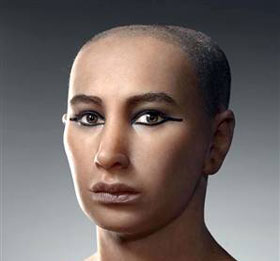King Tutankhamun died of a blood disorder
German scientists believe that the legendary Pharaoh Tutankhamun is likely to die due to hereditary anemia and they excluded the previous hypothesis that the Egyptian king died of malaria.
 Scientists at the Bernhard Nocht Institute of Tropical Medicine in Hamburg, northern Germany, questioned the conclusions of a major Egyptian study published in February on the cause of his death. this young king.
Scientists at the Bernhard Nocht Institute of Tropical Medicine in Hamburg, northern Germany, questioned the conclusions of a major Egyptian study published in February on the cause of his death. this young king.
The study, which included DNA tests and CT scans on Tutankhamun's mummy, claimed the king died of malaria after a fall and excluded the theory that he was killed.
However, German scientists stated on The Journal of the American Medical Association website that a closer study of Tutankhamun's leg bones found that he had anemia, in which red blood cells were deformation.
Tutankhamun died at the age of 19, after 10 years he reigned Egypt from 1333 to 1324 BC. Scientists have hypothesized many about his death.
- The truth is
- Egypt hopes to find the mystery of King Tutankhamun's death
- The 'different' portrait of Pharaoh Tutankhamun
- Egypt made a false tomb for King Tut
- Restoring the coffin of King Tutankhamun for the first time in nearly 100 years
- Successfully decipher the mysterious mummy penis of the Egyptian king
- Pharaoh Tutankhamun was killed by a war
- The hidden room in King Tut's tomb is full of treasures
- The truth was revealed at the tomb of pharaoh Tutankhamun: the scientific world was stunned
- The skeptical expert went to the secret room hidden in King Tut's tomb
- The discovery of 'precious' by King Tutankhamun
- Decipher the mysterious death of the famous Egyptian king
 Discovered an ancient centipede fossil 99 million years old
Discovered an ancient centipede fossil 99 million years old Discovered bat-like dinosaurs in China
Discovered bat-like dinosaurs in China Discovered a 200-year-old bronze cannon of the coast
Discovered a 200-year-old bronze cannon of the coast Discover 305 million-year-old spider fossils
Discover 305 million-year-old spider fossils